Coke's Crimes in Mexico
Campaign Reports | Newletter Archive
China | Colombia | El Salvador | Guatamala | India | Kenya | Pakistan | Philippines | Tanzania | Turkey
Campaign to Stop Killer Coke
Ray Rogers, Director | PO Box 1002 Cooper Station | New York, NY 10276-1002
(718) 852-2808 | Info@KillerCoke.org
August, 2021
Open letter to Mexican University Administrators, Faculty, Staff, Students
cc: Jose Antonio del Valle, Angel Alvarado, Alejandro Calvillo, Dr. Simon Barquera, Luis Manual Encarnacion Subject: Coca-Cola, human rights abuser and threat to the well-being of Mexico, its children and its citizens
Dear Administrators, Faculty, Staff and Students,
We recognize the exemplary role of all campus employees in helping students procure the best education possible. Unfortunately, there is a cancer within the university that violates its moral compass and should be eradicated.
The Coca-Cola Company (TCCC), with its decades of criminal and unethical practices, has treated Mexico as a colony to exploit.
Many ask, when will this exploitation that has seriously undermined our children's health and the health of our nation for the economic benefit of a handful of Coca-Cola executives, anchor bottlers like Coca-Cola FEMSA and wealthy investors like Warren Buffett ever end?
Coke's deplorable record of exploitation highlighted below makes the company undeserving of its influential presence on your campus:
- Complicity in the well documented kidnapping, torture and murder of union leaders and family members in Colombia and Guatemala;
- Over-exploitation and pollution of scarce potable water resources in countries like India, El Salvador and Mexico;
- Agressively marketing chemical, sugar-laden sodas to children that fuel the obesity, diabetes, hypertension and tooth decay epidemics;
- Employing illegal means to monopolize the soft drink market;
- Severely damaging local entrepreneurs through intimidation and trade secret theft and
• Cheating Mexican workers and the Mexican government out of billions of dollars through sophisticated tax evasion schemes
Add to this, TCCC denying the use of illegal dangerous child and forced labor in its supply chain and you have a description, not of a company that spreads happiness into the world, but instead inflicts great hardship and despair upon many people and communities throughout the world.
This 4-page leaflet spotlights the kind of corruption that is very much a part of Coke's culture and business practices.
This video demonstrates an ongoing evidence-based case of just how TCCC hinders economic and entrepreneurial development in Mexico, abusively attempts to destroy an individual, lies to the authorities and perverts the course of justice, as reported in El Financiero's May, 2021 article.
We hope a dialogue within departments of the university will lead to the removal of all Coca-Cola machines and beverages until the company acts responsibly and ends its criminal and unethical business practices.
Please do not hesitate to contact us if you have any questions. To communicate in Spanish or in English please e-mail at: info@ KillerCoke.org
Sincerely,
Ray Rogers
Director
Campaign to Stop Killer Coke
www.KillerCoke.org
Campaña para detener a “Killer Coke”
Ray Rogers, Director | PO Box 1002 Cooper Station | New York, NY 10276-1002
(718) 852-2808 | Info@KillerCoke.orgpaign to Stop Killer Coke
Agosto, 2021
Carta abierta a las Universidades e Institutos de Educación Superior de México Administradores, Docentes, Colaboradores y Estudiantes
cc: José Antonio del Valle, Ángel Alvarado, Alejandro Calvillo, Dr. Simón Barquera, Luis Manual Encarnación Tema: Coca-Cola, usurpador de los derechos humanos y amenaza al bienestar de México, de su niñez y de sus ciudadanos.
Estimados Administradores, Docentes, Personal y Estudiantes de la UNAM,
Reconocemos la labor ejemplar de todos los colaboradores de los diferentes campus ayudando a procurar el mejor nivel educativo posible para todos los estudiantes.
The Coca-Cola Company (TCCC), con sus prácticas criminales y poco éticas, se ha aprovechado y ha tratado a México como una colonia para explotarla durante décadas. Muchos se preguntan, ¿cuándo terminará esta explotación que ha socavado seriamente la salud de nuestros hijos y de nuestra nación, sólo para el beneficio económico de un puñado de ejecutivos de Coca-Cola, de embotelladores ancla como Coca-Cola FEMSA y de ricos inversionistas como Warren Buffett?
El deplorable historial de explotación de Coca-Cola que se destaca a continuación, hace notar como la empresa no merece la presencia que tiene en sus campus:
- Complicidad bien documentada en el secuestro, tortura y asesinato de líderes sindicales y sus familiares en Colombia y Guatemala;
- Sobre explotación y contaminación de los escasos recursos de agua potable en países como India, El Salvador y México;
- Mercadotecnia agresiva dirigida a los niños para promover refrescos cargados de azúcar y químicos que detonan epidemias de obesidad, diabetes, hipertensión y caries dental;
- Uso de medios ilegales para monopolizar el mercado de refrescos;
- Daño severo a emprendedores locales, a través de la intimidación y el robo de secretos industriales y
- Fraude a los trabajadores de México y al Gobierno Mexicano con miles de millones de dólares por medio de sofisticados esquemas de evasión fiscal.
Adicional a esto, TCCC negando el uso ilegal de trabajo infantil ilegal y el trabajo forzado en su cadena de suministro, no arroja la descripción de una empresa que propaga la felicidad en el mundo, sino que más bien inflige gran sufrimiento y desesperanza a muchísimas personas y comunidades en todo el mundo.
El folleto que se presenta a continuación exhibe el tipo de corrupción que forma parte de la cultura y de las prácticas comerciales de Coca-Cola.
Este video demuestra un caso actual, basado en evidencias sólidas de cómo TCCC obstaculiza el desarrollo emprendedor y económico en México: intentando mediante el abuso destruir a un individuo, mintiendo ante las autoridades y pervirtiendo el curso de la justicia, cómo está publicado en el artículo de El Financiero, mayo 2021.
Esperamos que un diálogo entre los departamentos de la universidad conlleve a retirar todas las máquinas dispensadoras de Coca-Cola y sus bebidas hasta que la empresa actúe responsablemente, y ponga fin a sus prácticas criminales y poco éticas. Por favor, no duden en ponerse en contacto con nosotros para resolver alguna pregunta.
Pueden comunicarse en español o en inglés enviando un correo electrónico a: info@KillerCoke.org
Atentamente
Ray Rogers, Director
Campaña para detener a “Killer Coke”
"Acorralan a Coca Cola" by Alberto Barranco, El Universal, June 7, 2012
Read Article
"La sorpresa llegó hace unos dias a la asamblea de accionistas de Coca Cola Company, la matriz mundial de las firmas productoras de la bebida gaseosa, cuando uno de los accionistas Ie preguntó a quemarropa a su presidente, Muhtar Kent, sobre la existencia de una serie de demandas en México, que a su juicio podrian provocarle daiios por mil millones de dólares...
"Coca Cola, pues, está en el callejón."
Translation:
"Coca-Cola on the Ropes" by Alberto Barranco, El Universal, June 7, 2012
Read Article
"The surprise came a few days ago at The Coca-Cola Company's annual shareholders meeting, the world headquarters of the company producing the carbonated soft drink, when one of the shareholders [Ray Rogers] asked CEO Muhtar Kent point blank about the existence of a series of demands in Mexico, which he believes could cost the company a billion dollars.
"Kent denied the allegations...
"The truth is that the Chief Executive Officer of Coca Cola lied...
"The problem for the company is in the investigation triggered by the persistence of this former marketing executive [Angel Alvarado], once commissioned in Costa Rica, causing this investigation by the Tax Administration System for alleged tax evasion...
"Coca-Cola, then, has no way out."
Coca-Cola: The Savage Quest for Liquid Money
Read Article
"Coca-Cola is delicious. This is what many people who drink the beverage would say if they were not being exploited. Yet, this is not the case in Mexico; in Mexico, citizens, while also being exploited in terms of labor, are indirectly forced to drink Coca-Cola because of the lack of water supply due to Coca-Cola's use of it. In order to perform such debasing acts, Coca-Cola is affiliated with political parties and advertises extensively throughout Mexico. Thus, in order to make a profit, Coca-Cola exploits the citizens of Mexico by depriving them of water and wages through its connection with the government and advertisements that will inevitably delay Mexico's advancement in the future."
The Angel Alvarado Agüero Case Exposing Coca-Cola's Corruption in Mexico
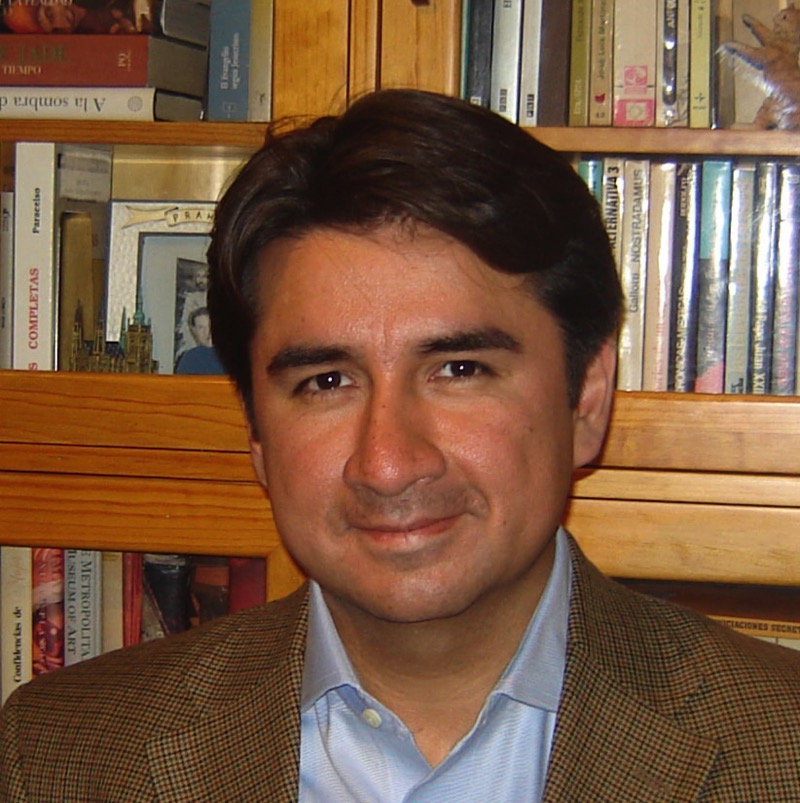
Angel Alvarado Agüero
Former 16-Year Employee
& Marketing Executive.
"My name is Angel Alvarado Agüero. After working 16 years at the multinational Coca-Cola Company and certain of its subsidiaries, I was unjustifiably dismissed. After understanding my basic employment rights under Mexican law, I chose to sue under labor and criminal law.
"I want to share my story with you. I imagine I'm not the only Mexican affected by a work simulation scheme described as "outsourcing" that companies use to avoid the responsibilities they have with their workers. I hope that the information here is useful for some people who face similar situations with this company or other corporations."
Angel Alvarado, a Mexican citizen hired by The Coca Cola Company right after graduation in 1990 from the Monterrey Institute of Technology, worked from entry level roles to top management positions in Mexico, Central America and the Caribbean. Alvarado was wrongfully dismissed in 2007 after questioning directives to become involved in illegal monopolistic practices to destroy Coca-Cola's competition. Subsequently, he initiated lawsuits against Coca-Cola when he was told he would not receive profit sharing and other benefits to which he was entitled for his years working for the Company.
This resulted in the exposure of a world of deception and corruption by Coca-Cola to avoid labor and tax responsibilities using a fraudulent outsourcing system. Alvarado's case has become an expose of how some multinational corporations operate in Mexico that hurt millions of Mexican workers and cheat the government out of millions of dollars of revenue.
En Español:
Mexicano, contratado por The Coca Cola Company al graduarse de la universidad. Trabajo en diversos cargos hasta niveles directivos en Mexico, Centro America y el Caribe. Despedido injustificadamente en 2007 al cuestionar practicas monopolicas de la empresa. AI inicial la lucha por sus derechos laborales y al exponer su historial laboral y vinculos con las diversas filiales de The Coca Cola Company desenmascara el esquema de "outsourcing" convirtiendose en uno de los csos mas representativos del pais de evasion de responsabilidades de las grandes corporaciones.
Angel and Raquel vs. Coca-Cola Goliath
Angel Alvarado Agüero, a former 16-year employee and top marketing executive for The Coca-Cola Company in Mexico, was wrongfully dismissed from the company in May 2007. This led to Alvarado filing criminal complaints against the company.
In addition to the reprehensible manner in which Coca-Cola got rid of Mr. Alvarado, the company also has cheated him out of mandatory profit sharing and other benefits by refusing to pay him monies accrued over his 16 years of service. But even more appalling, as Mr. Alvarado's legal cases will reveal, is that The Coca-Cola Company has also apparently cheated Mexican workers out of hundreds of millions of dollars in profit sharing and other benefits and shortchanged the Mexican government out of millions of dollars in tax revenues.
Mr. Alvarado's employment nightmare began after he questioned and refused a directive by the Company to carry out illegal monopolistic activity to destroy competition at the 700,000 mom and pop stores throughout Mexico where 80% of all soft drinks are sold. In the past Coca-Cola and its bottlers in Mexico, including Coca-Cola FEMSA, Coca-Cola's second largest bottler in the world, had been fined millions of dollars for similar unlawful behavior.
Breaking The Law: Business As Usual for Coca-Cola
Mexico, the country with the highest per capita consumption of Coca-Cola, is a huge profit center for Coke to the detriment of the health of millions of children and adults who suffer an inordinate rate of obesity, diabetes and other serious maladies. Coke controls more than 70% of the soft drinks' market in Mexico from which it derives 12% of its worldwide sales even though Mexico represents less than 2% of the world's population.
To control the soft drinks market in Mexico, Coca-Cola has shown repeatedly it will break the law. In 2002, Coca-Cola felt threatened by a new entry into the market called Big Cola produced by a Peruvian company. Within two years, as documented by well-known British social critic and journalist Mark Thomas in his book Belching Out the Devil (Ebury Press, 2008, Nation Books, 2009) Big Cola had captured 5% of the extremely lucrative Mexican market. So Coca-Cola decided to kill off this upstart business by unleashing an aggressive and illegal marketing effort - providing incentives for shop owners to remove competing brands and threatening to punish them if they didn't.
The company decided to employ a "vicious campaign of intimidation and coercion" to get shop owners to stop stocking Big Cola. But one small shop owner, Raquel Chavez, decided not to give in to Coke's demands and fought back. This led to the Coca-Cola Export Corporation (a wholly owned subsidiary of The Coca-Cola Co.) and its Mexican bottlers being found guilty of unfair monopoly practices. The Coca-Cola Co. was fined the maximum penalty of US $50 million.
In 2005 Mexico's Federal Competition Commission (Comision Federal de Competencia - CFC) fined the Coca-Cola system US $13 million for monopolistic practices which was upheld on appeal. The fine was leveled at the bottlers and distributors FEMSA, Contal, Grupo Peninsular, Grupo Fomento Querectano and The Coca-Cola Export Corporation.
Reuters reported in a story, "Mexico's Anti-Trust Watchdog Opens New Soft Drink Probe" (11/9/09): "The Federal Competition Commission, or Cofeco, is investigating charges that major players were offering perks to merchants on condition they only sold their soft-drink products, among other allegations, according to a notice published in the governments' daily gazette...in 2008, Mexico's Supreme Court upheld fines that had been handed out by Cofeco, totaling almost $15 million, against 15 Coca-Cola bottlers and distributors in Mexico on charges similar to the new investigation." Among the companies then fined was Coca-Cola FEMSA.
How Coca-Cola Broke the Law
Coke's sales force would order shop owners to remove Big Cola or else lose all promotional gifts and offers and eventually lose their coolers and be cut off from renewing supplies of Coke. An insider at Coca-Cola, referred to as "Coke Throat" by journalist Mark Thomas, described how the whole scheme worked and how it was The Coca-Cola Co. that coordinated the effort with Mexican bottlers.
Coke Throat stated, "[We're] the brain power and the mastermind behind everything... We [The Coca-Cola Co.] wanted to get out of this saying to people, 'we do not sell Coca-Cola and we didn't do anything, we just sell concentrate, but the reality - and that's why the Competition Commission brought us down - was that we have the brainpower and the money behind everything and we are the ones that make everything work in a synchronized way." Thomas points out that "The [Federal Competition Commission] investigation visited various shops to examine the claims against Coca-Cola and found that Big Cola was either not available or was placed at the back of the shop, away from the Coca-Cola fridges at the front, in 500 instances that they examined."
Coke's CEO Muhtar Kent Knew of Strong-Armed Tactics Used in Forced Resignation
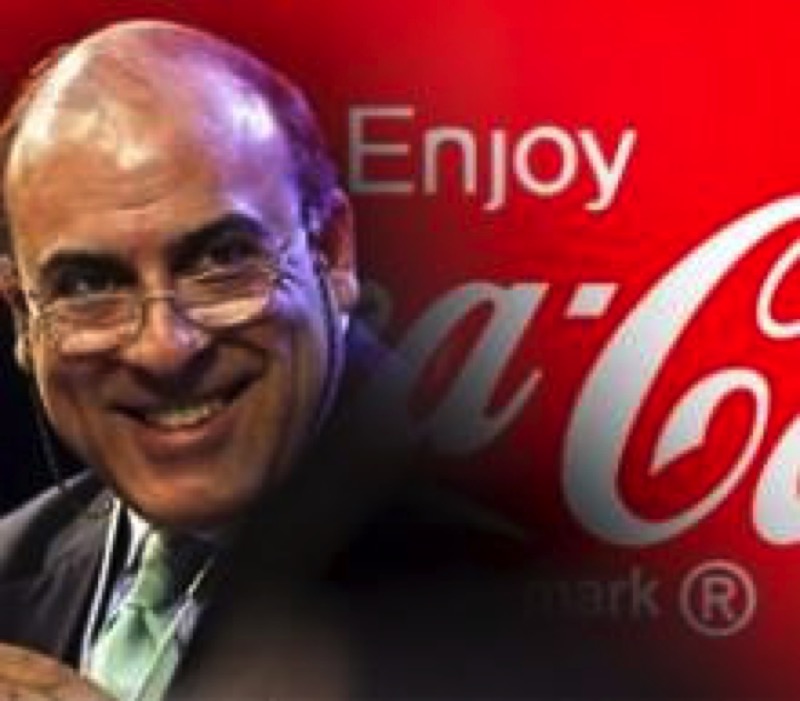
Muhtar Kent
Chairman & CEO
The Coca-Cola Company
A. Cervantes, a lawyer representing Mr. Alvarado, sent a letter to Muhtar Kent, Chairman and CEO of The Coca-Cola Co., dated December 15, 2009. The letter describes the injustice being dealt Mr. Alvarado and sought Mr. Kent's intervention. Mr. Alvarado was a loyal employee whose hard work and outstanding performance within Mexico and abroad had won him several promotions, raises and letters of commendation from his superiors, including Jose Octavio Reyes, President of The Coca-Cola Company's Latin America Group.
The letter describes how Mr. Alvarado was summoned to a meeting room where company officials, attorneys and others awaited his arrival. Upon his arrival, an armed guard was stationed outside the door of the room where Mr. Alavarado was held against his will. Under extreme duress, he was forced to sign a letter of resignation before a notary public brought in for the specific purpose of witnessing his resignation.
Mr. Alvarado did not want to sign the letter and requested that if the company meant to separate him from his job that it should do so formally. Somehow the notary neglected this detail in describing what he saw during the meeting that day.
Alvarado was being forced to resign because he refused an order from his boss that violated the company's code of conduct and Mexican law. Leading up to his "resignation" his functions and number of assistants were reduced, he was kept out of important meetings, his desk was ransacked and his emails were read looking for anything that might be used against him.
Two of his superiors, Juan Arnabar and Octavio Alvarez, irate over Mr. Alvarado going over their heads with his concerns, decided he should be expelled from the company and accused him of being a whistleblower, giving away confidential information and violating the company's code of conduct.
Coke's Defrauding of Alvarado Opens Scrutiny to Wider Scandal
After his forced resignation, Alvarado learned that he was to be punished even further. He would not receive his personal file nor the severance compensation and benefits that he was entitled to, pursuant to Mexican law and the different plans of The Coca-Cola Company.
How did the Coca -Cola Company figure to defraud Mr. Alvarado out of hundreds of thousands of dollars? By saying he resigned and by making the outrageous claim that he was never employed by the The Coca-Cola Co. or The Coca-Cola Export Corporation. If this was the case, then why did Mr. Alvarado receive payments such as the one shown here:

This is a check from The Coca-Cola Export Corporation for US $21,148.35. Remember, The Coca-Cola Export Corporation is a wholly owned subsidiary of The Coca-Cola Company. Its headquarters has the same address and phone number as The Coca-Cola Co., that is, 1 Coca-Cola Plaza NW, Atlanta, Georgia, Phone 404-676-2121, and Geoffrey Kelly, general counsel and senior vice-president of The Coca-Cola Co. has held a series of positions in the legal departments of both The Coca-Cola Export Corporation and The Coca-Cola Co.
In explaining the charade around Coca-Cola's efforts to discredit Mr. Alvarado, Mr. Cervantes posed this question to Muhtar Kent: Why would anyone give credence to the notion that Mr. Alvarado, after providing exemplary service to a company he cherished for nearly two decades and in which he expected to rise, suddenly, with no other employment opportunity, decide to cut ties with the company?
But Mr. Kent, shown by his efforts to coverup the Alvarado case at Coca-Cola's 2010 annual shareholders' meeting, obviously did not want to hear any of this. In responding to a statement raised by Campaign to Stop Killer Coke Director Ray Rogers at the meeting, Mr. Kent made the mistake of lying to shareholders when he stated that litigation in Mexico has been canceled for lack of merit and "The appellate courts have rejected one by one" these cases. Several major newspapers in Mexico berated Mr. Kent for lying about the ongoing criminal proceedings against Coca-Cola in Mexico since Mr. Alvarado's case and the serious issues it highlights are important to the Mexican economy, consumers, workers and the government.
Kent Continues to Lie to Shareholders at 2011 Annual Meeting and Tries to Cover Up Illegal Activity in Mexico
Ray Rogers's Statement and Kent's Response at the 2011 Annual Meeting
Simulación por Outsourcing: Prácticas de Coca Cola México — Columnas
Por: ALBERTO BARRANCO
Read Article
Investigan por evasión vía outsourcing a Coca Cola; anuncia STyPS operativos en QR
Watch on YouTiube
Defrauding Mexican Workers and Mexican Government
In Mexico, there is a law that companies must distribute 10% of their pretax profits each year to its employees. The 400 white and blue collar employees/managers of The Coca-Cola Export Corporation did the marketing, production and distributions of the syrup to the bottlers and with profit sharing they were all able to make a comfortable living.
The Mexican Federal Labor Law (LFT) "regulates employee relationships in Mexico regardless of nationality or place of entry into the employment agreement." Section 1(a) of the Mandatory Employee Benefits states:
"Profit Sharing: All employers must distribute among their employees an amount equal to 10% of the employer's pretax profit within 60 days after the employer is required to file its year-end income tax return. Fifty percent of this amount is to be distributed in proportion to the number of days worked by each employee during the year, and the remainder according to the wages of each employee."
Mexican Federal Labor Law (LFT)
In order to avoid paying hundreds of millions of dollars in profit sharing to hundreds of Mexican workers, The Coca-Cola Export Corporation created a new company in 1986. This new company, a wholly owned subsidiary of The Coca-Cola Export Corporation was named Integrated Services Management and Senior Management (SIAAGSA). The Coca-Cola Export Corporation then fired all its employees in Mexico and hired them back immediately into SIAAGSA. SIAAGSA will always show little to no profit. For example, in 2007, when Mr. Alvarado was forced out of the company, The Coca-Cola Co./Coca-Cola Export Corporation, made US $700 million. Thus $70 million should have been distributed among hundreds of employees instead of just a few million dollars that was divided among the workers.
Because SIAAGSA showed little profit, the profit sharing only benefited a small number of top executives at Coca-Cola. Coke claims that Mr. Alvarado has always been an employee of SIAAGSA, and was not eligible to participate in the profit sharing!
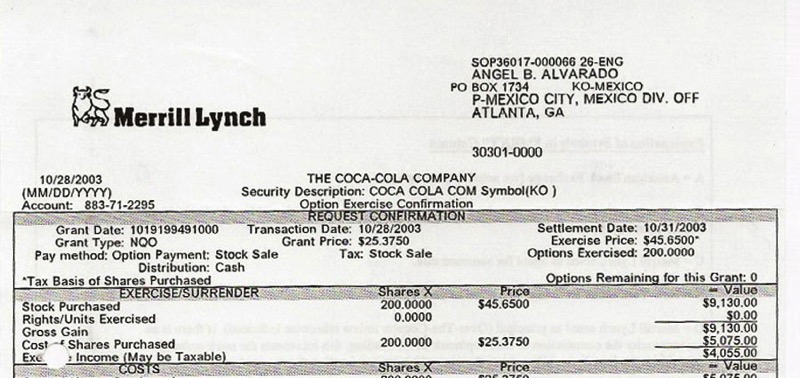
(See other examples of documents showing Mr. Alvarado's relationship to The Coca-Cola Co.)
James Quincey, who in 2005 was appointed president of Coca-Cola's Mexican division also became the head of SIAAGSA in 2007. Quincey was involved in what was fast becoming a scandal. He was transferred outside the country and in October 2008, he became president of the Northwest Europe and Nordics Business Unit and later the company's Europe Group. In 2013, he became President and Chief Operating Officer of The Coca-Cola Company and on May 1, 2017 will succeed Muhtar Kent as CEO.
Coca-Cola's shell game, with the creation of SIAAGSA more than two decades ago, has led to Mexican workers and the Mexican government being cheated out of hundreds of millions of dollars.
Alvarado's case against Coca-Cola even reached the Mexican Congress in October 2009 and it has received extensive media attention in Mexico. Congress requested Mexico's IRS and General Attorney to investigate how Coke has damaged the economy and cheated the Mexican government and Coca-Cola workers out of millions of dollars through the scheme of outsourcing. In response, Coke has increased its public relations efforts and its political contributions to suppress efforts in Congress.
See video "Caso Cola Cola Outsourcing Camara de Diputados"
Five important articles in Mexico on the Alvarado case and Coke's illegal outsourcing and tax evasion schemes:
"Acecha el fisco a Coca Cola" ("Stalk the Treasury to Coca Cola") By Alberto Barranco, El Universal, 11 de Mayo de 2011
"Pide Hacienda al SAT analizar possible fraude de Coca-Cola," By Juan Carlos Miranda, La Jornada, 5 de Mayo de 2011
"Investigan a Coca-Cola por evasión fiscal" by Alfredo Gonzalez, Reforma, Business Section, 4 de Mayo de 2011
"Las trampas de Coca-Cola Carlos Acosta Córdova (defrauda al fisco en México)," Las trampas de Coca-Cola, Carlos Acosta Córdova, Proceso, 1 de Mayo de 2011
"Coca Cola: La chispa de la evasión fiscal," By Francisco Gomez, SinLinea, Abril de 2011
Read Article Online | PDF
"Investment Community Should Demand Coke CEO Muhtar Kent's Immediate Ouster" Release, Campaign to Stop Killer Coke, May 11, 2011
Read in English | Spanish
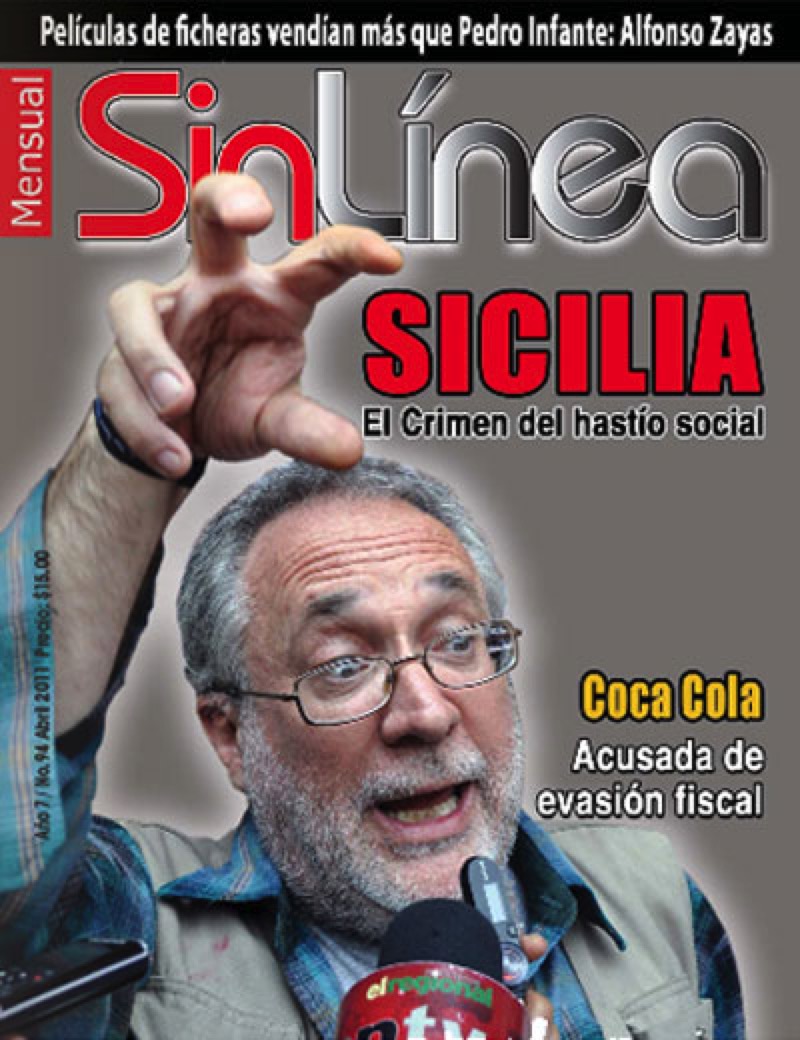
Coke Plunders Mexico's Health, Water & the Environment
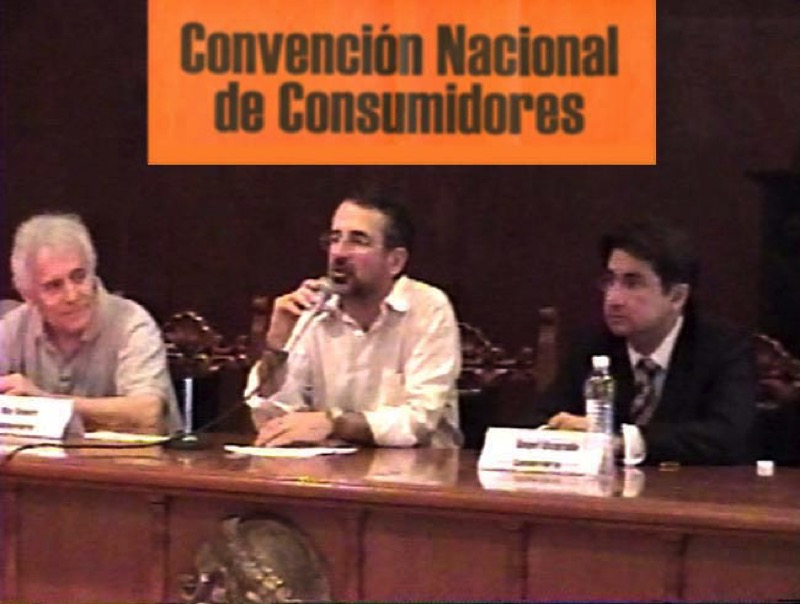
From left to right: Ray Rogers, Alejandro Calvillo Unna & Angel Alvarado Agüero
Mexico ranks second in the world for obesity among countries. Millions of people have no access to drinkable water and 80% of schools have no access, so children drink what they can get and Coca-Cola makes sure plenty of their addictive sugar, caffeine laden soft drinks are readily available. That is a main reason why so many Mexican children are suffering from diabetes and other health problems related to obesity. Sodas are the main source of refined sugar in the diet of the Mexican people.
El Poder del Consumidor Fights Killer Coke
A major thorn in the side of Coca-Cola and the junk food industry in Mexico is Alejandro Calvillo Unna, director and founder of El Poder del Consumidor (the Power of the Consumer). (www.elpoderdelconsumidor.org)
Campaign Director Ray Rogers spent four days in Mexico City in March 2010 where he along with Angel Alvarado Agüero addressed Mexico's first National Consumer Convention (Convencion Nacional de Consumidores) chaired by Alejandro Cavillo. Rogers and Agüero did a series of interviews with the media on the Campaign to Stop Killer Coke and Mr. Agüero's case against Coca-Cola. They met with many leaders of consumer groups who want to help spread the Campaign throughout Mexico.
Calvillo and El Poder del Consumidor led the fight that forced Coca-Cola to again remove the artificial sweetener cyclamate from its diet beverages. Cyclamate had been banned in the U.S. and Mexico because it had been linked to cancer. According to Mark Thomas in "Belching Out the Devil," the ban on cyclamates in Mexico was lifted with the help of Mexican President Vicente Fox, shortly before he left office in December 2006. This was a boost to Coca-Cola since it was much cheaper than other artificial sweeteners. Coke launched Coke Zero with cyclamates in Mexico "almost immediately after the ban was lifted."
Furthermore, when the Mexican government decided to eliminate junk foods and drinks including sugary beverages from their schools, the beverage companies led by Coca-Cola united to fight the ban. Coca-Cola continues to push mass consumption of their unhealthy soft drinks on Mexico's youth. In a note from Xaviera Cabada Barron, Asistente General of El Poder Del Consumidor, she wrote, "Here's the pictures I told you about. The first two pictures are from inside a school in Chilapa Guerrero. You can see the basketball court with the same colors of Coke and behind all the propaganda in the cafeteria. The last two pictures are about the summer camp they organized for the kids. Years ago Coke had said that they were not going to do any propaganda to children under 12. I guess Mexico is the exception."
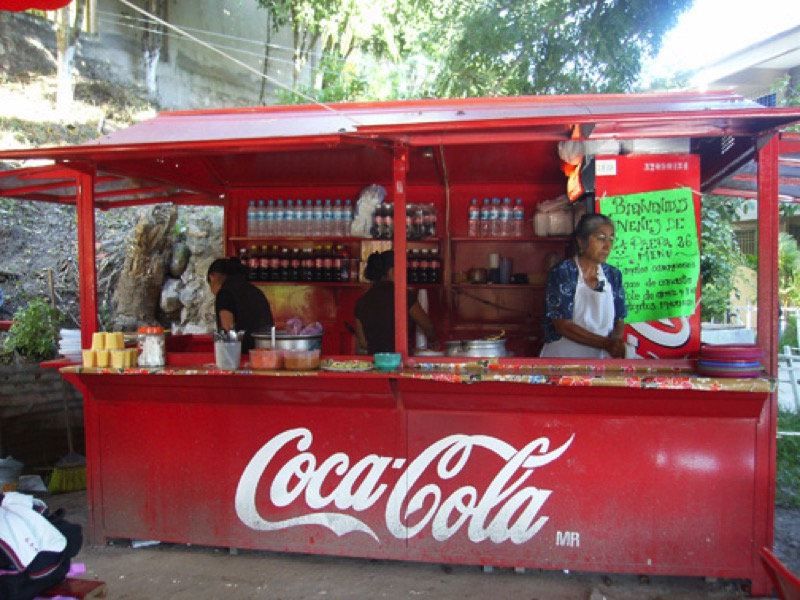
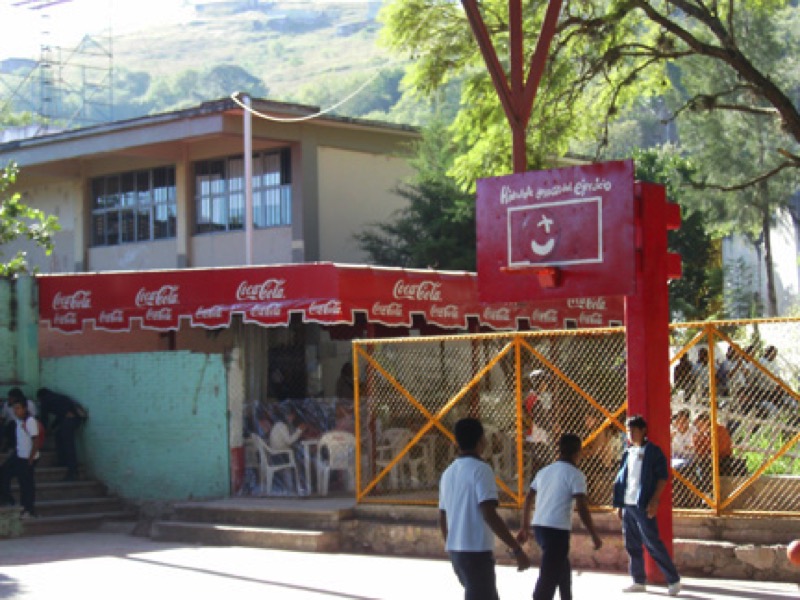
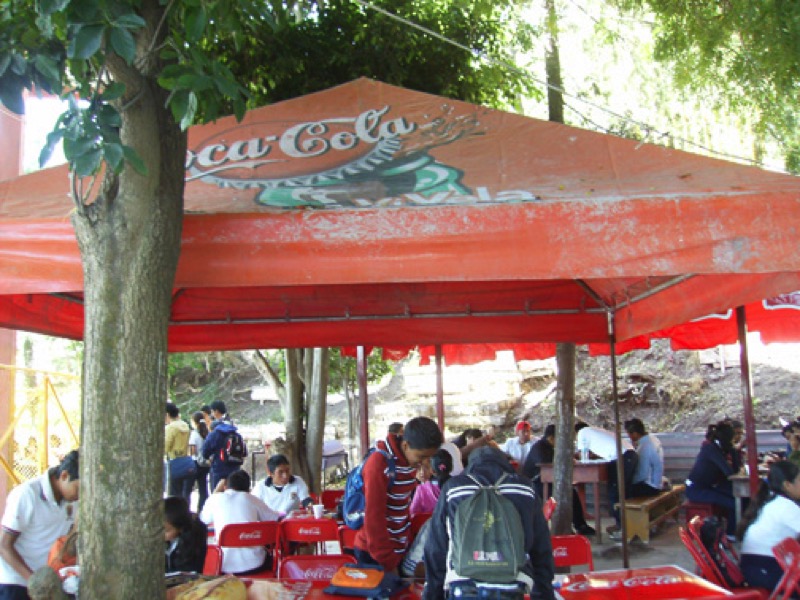
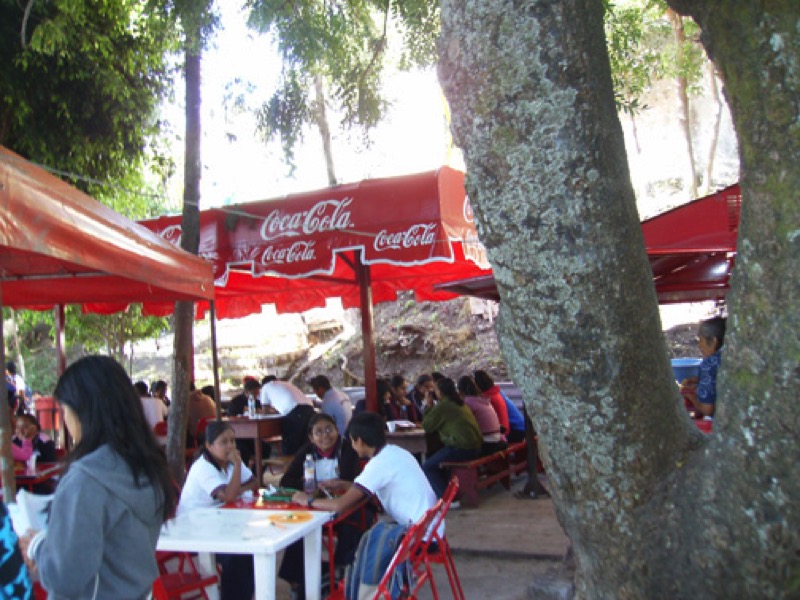
Historias Endulzadas "Coca Cola" by El Poder del Consumidor
In his book, "The Coke Machine," (Penguin Group, September 2010) Michael Blanding describes that, as in the United States, "investment in schools in Mexico has often gone hand in hand with supporting the Coca-Cola Company's goal to sell more soft drinks to kids...the bottler prevailed upon the community store next door to exclusively sell Coca-Cola drinks, with a bright sign painted right next to the school. In other cases, it has splashed Coke logos all over school basketball courts behind the schools. In one, the backboards and foul circles are covered in the Coke logo, while Coke signs hang in the stands and spectators swig Coke as they watch."
Statement for Frente Civico: Absurdity at UNAM (Absurdo que la UNAM)
Frente Civico in Mexico asked the Campaign to make a statement about the unhealthy, sugary soft drinks industry led by Coca-Cola in Mexico trying to portray itself as a promoter of healthy living. The venue is a museum on Mexico's largest university campus, Universidad Nacional Autonoma de Mexico (UNAM). The following is a statement issued by Campaign to Stop Killer Coke Director Ray Rogers, which was translated into Spanish by a member of Frente Civico.
Absurdo que la UNAM mezcle la "Salud:
Vida y Equilibrio" con Coca-Cola Company y la Industria Refresquera
Ray Rogers, Director, Campaña Stop Killer Coke, 3/29/2011
Leer Declaración
Es el colmo de la hipocresía que los embotelladores de refrescos en México, representada por ANPRAC (Asociación Nacional de Productores de Refrescos y Aguas Carbonatadas), el lanzamiento de "Salud: La vida en equilibrio" de la sala de Universum, Museo de las Ciencias de la UNAM. Esta habitación está supuestamente destinada a promover un estilo de vida saludable en particular para los niños y jóvenes. Sin embargo, ANPRAC es el brazo mexicano de la American Beverage Association (ABA). Ambos ANPRAC y ABA son controladas por Coca-Cola. Esta sala no puede promover la salud.
Se trata de una estafa de relaciones públicas para perpetuar la idea de que Coca-Cola y otras compañías de refrescos se preocupan por la salud de los niños. Esta es una de las formas en que la industria de los intentos de echar la culpa de su agresiva comercialización de bebidas refrescantes no saludables, que la presión la hipertensión, la obesidad, la diabetes y la caries dental en los niños en particular. Nuevos estudios también vinculan los ingredientes en estas bebidas con el cáncer y enfermedades del corazón. El que la Universidad y el UNIVESUM que se asocie con The Coca-Cola Company y la industria de los refrescos es francamente deplorable. Sirve para promover el nombre de Coca-Cola, incluso fortaleciendo la empresa y su influencia política en México, un país en donde sigue haciendo un gran daño a la salud de sus habitantes.
México es uno de los que mas consumen refrescos en el mundo – un lugar de grandes ganancias para Coca Cola con un detrimento terrible para la salud de los mexicanos. Sin duda la obesidad y la diabetes son preocupantes aquí...
Esta conducta inaudita sólo hace Coca-Cola una empresa que la UNAM y su museo UNIVESUM deben evitar. La mejor leccion que la UNAM podría dar para promover la Salud: Vida y Equilibrio" es deslindar esta sala de la industria refresquera, preferiblemente prohibiendo todas las bebidas Coca-Cola y otros productos no saludables en la UNAM.
Absurdity at UNAM
Mixing "Health: Life and Balance" with Coca-Cola and Soft Drinks Industry
Statement from Ray Rogers, Director, Campaign to Stop Killer Coke, 3/29/2011
Read Statement
"It is the height of hypocrisy to have the soft drink bottlers in Mexico, represented by ANPRAC (National Association of Producers of Soft Drinks and Carbonated Water), launch the "Health: Life in Balance" room of the Universum, Museo De Las Ciencias De La Unam. This room is supposedly meant to promote a healthy life style particularly for children and youth. However, ANPRAC is the Mexican arm of the American Beverage Association (ABA).
"Both ANPRAC and the ABA are heavily dominated by Coca-Cola. This room is not about promoting health. It's a public relations scam that perpetuates the notion that Coca-Cola and other soft drink companies are concerned about the health of children. This is one of the ways that the industry attempts to shift the blame from their aggressive marketing of unhealthy soft drinks, which fuel high blood pressure, obesity, diabetes and tooth decay in children particularly. New studies also link ingredients in these beverages to cancer, stroke, heart disease and other illnesses.
"For the University and the museum to be associated with The Coca-Cola Company and the soft drinks industry is deplorable. It serves to promote Coca-Cola's brand name and extends the company's and industry's political influence throughout Mexico, a country in which they continue to do great harm...
"The best example that UNAM could make to promote "Health: Life and Balance" is to disassociate it's "Health: Life and Balance" room from the soft drinks industry and remove all Coke beverages and other unhealthy products from the UNAM campus."
Coke's Overexploitation of Water
Coca-Cola's negative impact in Mexico is described by Beverly Bell in the magazine In These Times (10/6/06). Coke controls 60% of the soda market and "each Mexican consumes an average of 483 eight-ounce glasses of Coke per year, in a country where more than 12 million people do not have access to potable water," she writes. In recent years, Coke got lots of help in its efforts to privatize water from then-Mexican President Vicente Fox, who prior to his election in 2000 was president of Coca-Cola in Mexico and Latin America.
According to Bell, "Coke is also widely produced in Mexico, an arrangement that is threatening the country's water supplies and undercutting indigenous control of natural resources. It takes three cups of water to make one cup of Coke. Since 2000, Coca-Cola has negotiated 27 water concessions from the Mexican government. Nineteen of the concessions are for the extraction of water from aquifers and from 15 different rivers, some of which belong to indigenous peoples. Eight concessions are for the right of Coke to dump its industrial waste into public waters.
"To aid the extractive and dumping processes, Fox-with help from the World Bank-has successfully pursued water privatization, as well as a massive land privatization program, that allowed companies free access to all the resources on the land, including water.
"After Fox's victory in 2000, Coca-Cola began bottling water from the richest aquifer in the Chiapan town of San Cristobal de las Casas, an ecological reserve administered by a conservation group Pronatura, which receives money from Coca-Cola Mexico. In 2004, the Coke plant in San Cristobal de las Casas used 107,332,391 liters of water — about as much as 200,000 homes."
The adverse effects Coca-Cola's presence in the Chiapas region was noted in 2006 by the United Kingdom-based group War on Want. (The War on Want"s "Coca-Cola: The Alternative Report" can be found here in three languages.) Citing work by the Centre for Economic and Political Investigations of Community Action , the report notes: "Coca-Cola is positioning itself to take control of the water resources of the war-torn Mexican state of Chiapas, say local activists, who complain that the company has pressured local government officials into using preferential zoning laws to allow the privatization of water resources. Chiapas is rich in water, yet local communities have protested at being denied access to it."
Corporate Prey for Predator Coke
Dr. Ann Lopez, author and environmental science professor, Ph.D., at San Jose City College in California and Director of the Center for Farmworker Families, states:
"The people of west central Mexico are easy corporate prey for predator Coke. You can't stand anywhere in some of the rural towns and not see a Coke ad. I've seen what Coke is doing in the west central Mexico countryside where I do research: pushing their addictive products on peasant populations who can ill afford them and in which one in 10 may have undiagnosed diabetes."
She points out that struggling people, unaware of the ill effects of the soft drinks, will "sell the healthy things that they grow on the land, like corn, beans and eggs from chickens to buy cola which they eventually become addicted to." She quotes Vicente Silva, a former municipal president of Chilchota saying that "Coke and beer arrive at the Purepecha indigenous towns and villages, in the morning, before the arrival of milk!"
Boing! A Great Alternative to Coke's Unhealthy Beverages
Boing! is a successful company now owned by workers after a long bitter struggle. Boing! is one of Coke's strongest competitors in Mexico.
This is an exciting story of a strike, strikebreaking and murder leading to the workers taking over the company and forming a cooperative. Read the story below to see how Pascal and its beverage, Boing!, became one of Coke's major competitors in Mexico:
The Fruit Juice of Resistance: Why We Love Boing!
"As so often happens with capitalism, the more the company expands, and the more money it makes, the more it screws over its workers. Such was the case with Pascual. Workers were working longer hours to produce more beverages at faster rates. Accidents in the workplace increased, working conditions worsened, but fortunately for Jimenez [Pascual's founder], most of the workers were peasants from the countryside who were unaware of their rights.
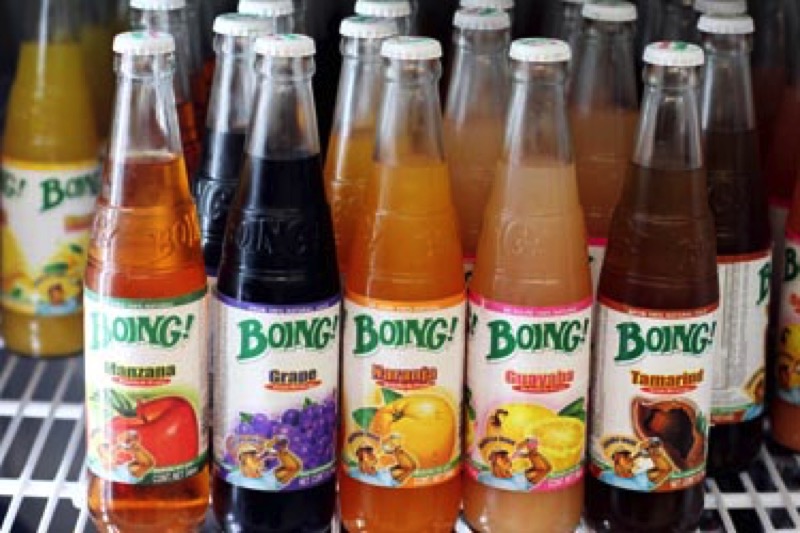
Photo by Nancy Siesel taken in a Mexican Store, La Palmita, in Dudley, North Carolina.
"Then in the 1980's, the Mexican economic crisis hit and saw a rapid and devastating devaluation of the peso. In March of 1982 President Jose Lopez Portillo issued a decree ordering an emergency increase in workers' salaries. Jimenez ignored it... a group of Pascual workers went to the offices of the Mexican Worker's Party for help in demanding their pay increase.
"When Jimenez discovered this, he promptly fired 150 workers. This did not sit well with the rest of the Pascual employees, who went on strike in the southern Pascual plant (the company has two plants, on the north and south sides of Mexico City) on the 18th of May 1982..."
"The struggle continued throughout the next two years, with the strong support of many civic organizations and the pueblo in general. The workers organized, studied, and solicited legal and financial advice, and in August of 1984, in a meeting with president Miguel de la Madrid Hurtado, they demanded that the property of the Pascual company be turned over to the workers, who would agree to work as a cooperative...
"The cooperative now occupies 15 percent of Mexico's soft drink market and employs more than two million people between factory workers, distributors, fruit growers, and cane producers. It has won a series of awards in both the Americas and in Europe for the quality of its products, the working conditions in its factories, and its treatment of workers...
"The Pascual Cooperative also produces increasingly rare non-synthetic soft drinks. While Coke, Pepsi, and the vast majority of other soda companies rely entirely on high fructose corn syrup (which is not only proven to lead to diabetes and obesity but also contributes to the environmentally and economically destructive dependence on cheap corn) Pascual sweetens its beverages with sugar, and, even more radically, fruit.
"Seems like a bright sunny story of a cooperative that isn't laying off workers and opening up Cambodian sweatshops, right? Ah, but here's the tragic ending: it's going bankrupt. Coke is not so thrilled about the ingression of an entirely Mexican-owned cooperative on the extremely lucrative Mexican beverage market..."
Review: Pascual Boing! Mango
Feb 5th, 2008 by Steve Tanner, Bev Review
Read Article
"Let's sample a drink from south of the border, shall we? It's Pascual Boing! Mango, a fruit drink imported from Mexico, featuring flavor pulled from 100% natural pulp. We picked up a bottle at a local Hispanic supermarket here in Chicago and decided to check it out!"
Also, add a photo credit to the Boing! photo:
"Photo by Nancy Siesel taken in a Mexican Store, La Palmita, in Dudley, North Carolina."
Employment Discrimination
Coca-Cola has been criticized for discriminatory workplace practices in Mexico. The Chicago Tribune (10/30/06) reported: "Job seekers considered too old, too chunky or too dark are screened out by companies that sometimes specify the ideal candidate's marital status, height, weight, tone of voice, even the part of town in which the person should reside. What is less known is that many U.S. corporations — including Coca-Cola...are engaging in hiring practices that appear to violate their U.S. fair employment policies...
"'Why are so many of them not complying with the same standards they have to comply with in the United States? Because they can get away with it,' said anti-discrimination attorney Gloria Allred."
CIEPAC Fights Killer Coke
CIEPAC (Chiapas, Mexico), "Stop Killer Coke: The Boycott Coca-Cola Campaign," 2006
CIEPAC (Center for Economic and Political Research for Community Action) is a civil organization in Chiapas that seeks to build a more democratic world, with justice and dignity for all peoples.
Here is an extensive report on Coca-Cola done by CIEPAC in 2006, filled with wonderful graphics, abusive history and commentary.
Read CIEPAC's Pamphlet
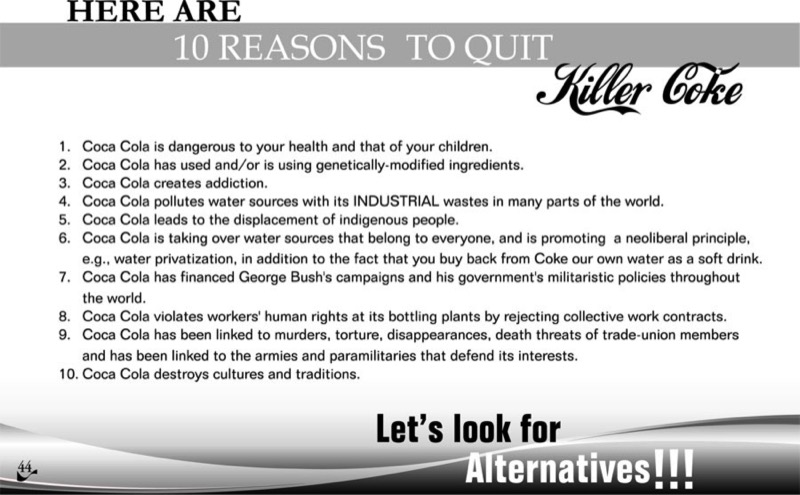
Image from CIEPAC's Pamphlet, "Stop Killer Coke: The Boycott Coca-Cola Campaign."
Boletines de CIEPAC:
CIEPAC (Centro De Investigaciones Economicas Y Politicas De Accion Comunitaria)
CIEPAC's Website: www.ciepac.org
Logra Rogers expulsar a Coca Cola de escuelas en EU
By Elena González | Revista Zocalo | Miércoles 29 de Diciembre de 2010 | Read Article
Junk Food Regulations in Schools Fall Short, Consumer Groups Say
By Emilio Godoy | IPS MEXICO | Aug. 23, 2010 | Read Article
"A historic opportunity was lost, because food conditions and habits in the schools will not be modified, since these products will still be allowed to be sold there. The consumption of calories will remain unchanged," Alejandro Calvillo, director of El Poder del Consumidor, a consumers group pushing for a healthy diet in schools, told IPS. ..
"There is a regrettable distance between the guidelines presented by COFEMER and the original proposal," Avila said. "One concession that was made was to allow beverages with sweeteners in high schools..."
Mexican television broadcasts 20,000 commercials a year targeted at children, 8,000 of which encourage consumption of high-calorie products...
The widespread conclusion among experts and consumers associations is that the ministries of education and public health, and COFEMER, yielded to lobbying by food and beverage manufacturers.
Alimentos chatarra y refrescos seguirán en las escuelas
El Poder del Consumidor | 13 Agosto 2010
Read Article
Las secretarías de Salud y de Educación Pública cedieron a las presiones de la industria de alimentos procesados, ya que la comida y bebidas chatarra no saldrán de las cooperativas escolares a partir del próximo ciclo escolar, como se había anunciado.
Se rajó el Gobierno
Por: Alberto Barranco | El Siglo de Torreon | 30 de jul, 2010 | Read Article
La paradoja del caso es que mientras el Gobierno, a contrapelo de las fanfarrias que lanzó al vuelo al plantearse la estrategia, se raja cuando en otros países se avanza a pasos gigantes...
Lo cierto es que en el escenario de la reversa lanzada por el Gobierno está una llamada de la Casa Blanca en que se defendió bizarramente a la marca más emblemática en ese país: Coca Cola, de lo que se consideraba una agresión. Se rajó el Gobierno.
Demanda ex ejecutivo al presidente de Coca-Cola
Por: Juan Carlos Miranda | La Jornada | Jueves 20 de mayo de 2010 | Read Article
El presidente mundial de The Coca Cola Company, Muhtar Kent, mintió a accionistas de la compañía, al asegurarles que en México no existe ningún proceso penal en contra de la empresa, sostuvo Ángel Alvarado Agüero, ex ejecutivo de la trasnacional que en diciembre de 2008 la demandó por fraude...
En un comunicado, Alvarado puntualizó que Kent contestó de esa manera para crear un falso sentido de seguridad a los inversionistas, por la pérdida de confianza que generaría la investigación que se realiza en el segundo mercado más grande del mundo para la trasnacional después de Estados Unidos.
Banning Junk Foods in Mexico's Schools to Fight Obesity
By Emilio Godoy | IPS MEXICO | May 28, 2010 | Read Article
MEXICO CITY, May 28, 2010 (IPS) - Consumer organisations and experts say the Mexican government's plan to remove junk food from schools is a step in the right direction in the fight against obesity in this country, which has the highest rate of childhood obesity in the world, and the second highest rate for adults, after the United States...
The processed food and beverages industry opposes mandatory regulations, and NGOs fear it may lobby COFEMER to modify the government proposal.
Mexico faces soaring childhood obesity rate
By Ken Ellingwood | Los Angeles Times | April 22, 2010 Read Article
The reforms, relayed to the Senate, led some newspapers to crow that junk food, known here as comida chatarra, had been expelled from school.
Not quite.
Critics said the measure wouldn't ban anything; it merely calls on health officials to establish "official Mexican norms" for student well-being and ensure that food sold in schools provides "greater nutritional content" and avoids excessive fat and sugar.
Other consumer advocates charged that lawmakers shied away from taking on soft-drink and snack-food giants such as Coca-Cola and Sabritas, a subsidiary of PepsiCo that makes potato chips and other snack products.
Mexico's anti-trust watchdog opens new soft-drink probe
By Veronica Sparrowe and Michael O'Boyle | Reuters | Mon Nov 9, 2009 | Read Article
Mexico's anti-trust watchdog said on Monday it launched a new investigation into alleged monopoly practices in the nation's soft-drink market, one of the world's biggest.
The Federal Competition Commission, or Cofeco, is investigating charges that major players were offering perks to merchants on conditions they only sold their soft-drink products, among other allegations, according to a notice published in the government's daily gazette.
Large Mexican companies have been largely successful in using legal injunctions to avoid most charges of monopolistic practices.
But in 2008, Mexico's Supreme Court upheld fines that had been handed out by Cofeco, totaling almost $15 million, against 15 Coca-Cola bottlers and distributors in Mexico on charges similar to the new investigation.
Among the companies then fined was Coca-Cola FEMSA
SUPREME COURT RULINGS AGAINST COCA-COLA, FORD REINFORCE RIGHT OF MEXICAN GOVERNMENT TO PROTECT PUBLIC INTEREST
All Business, A D&B Company | Wednesday, October 31 2007 | Read Article
In two decisions in late October, Mexico's high court (Suprema Corte de Justicia de la Nacion, SCJN) issued rulings against Mexican subsidiaries of Coca-Cola and Ford, reinforcing the right of the Mexican government to protect the public interest. In the case of Coca-Cola, the high court upheld a ruling from the anti-trust agency Comision Federal de Competencia (CFC) that eight bottling companies affiliated with the US-based multinational company had engaged in monopolistic practices...
SCJN says anti-monopoly agency was correct in going after Coca-Cola
The court's ruling in the Coca-Cola case upholds the right of the CFC to enforce Mexico's anti-monopoly laws. The eight bottling companies, which include Propimex, Embotelladora la Victoria, The Coca-Cola Export Corp., Yoli de Acapulco, Industria Refresquera Penínsular, Embotelladora Zapopan, Coca-Cola Femsa, and Panamco Bajio, had filed legal action against the CFC after the commission imposed fines against the Coca-Cola affiliates for engaging in practices that stifled competition from other bottling companies, namely Pepsico and Big Cola. In their lawsuit, the eight companies were seeking the return of 94 million pesos (U$8.8 million) in fines levied by the CFC.
Coke is forced to pay $1m fine in Mexico
Financial Times | May 29, 2007 | Read Article
The Coca-Cola Export Company, the Mexican subsidiary of the Atlanta-based drinks manufacturer, will have to pay a $1m fine for adopting monopolistic practices after a court on Sunday turned down the company's final attempts to appeal against an earlier ruling.
The fine is the first successful prosecution among 70 similar cases brought in recent years against Coca-Cola and its bottlers in Mexico by the country's Federal Competition Commission (Cofeco)...
Coca-Cola Femsa, which is one of 14 bottlers involved in Cofeco's investigation into monopolistic practices, is now the world's second largest Coca-Cola bottler, and accounts for about 10 per cent of the Atlanta-based company's global sales.
Mexico's corporate landscape is dominated by a handful of powerful companies, and economists argue that the resulting absence of competition has kept prices artificially high for consumers and reduced productivity and economic growth...
In 2002, Mexico's antitrust commission found Coca-Cola and 89 of its bottlers guilty of trying to keep competitors out of the Mexican soft drinks market.
Upstart firm in Peru taking fizz out of cola giants / Coke, Pepsi face unlikely challenger
By Marla Dickerson | Los Angeles Times | December 30, 2005| Read Article
Coca-Cola products remain far and away the No. 1 sellers in Mexico, with a market share that tops 70 percent. Still, the Mexican government this year slapped 15 Coke bottlers and distributors here with nearly $15 million in fines for anti-competitive practices aimed squarely at the company's pipsqueak rival. Mexico's Federal Competition Commission said the Coke dealers unfairly pressured mom-and-pop retailers not to carry Big Cola by threatening to stop Coke deliveries and yank from their tiny stores such perks as free refrigerators.
Atlanta's Coca-Cola, which owns 40 percent of Mexico's largest bottler, Coca-Cola Femsa, said it would challenge the ruling and defended its business practices.











